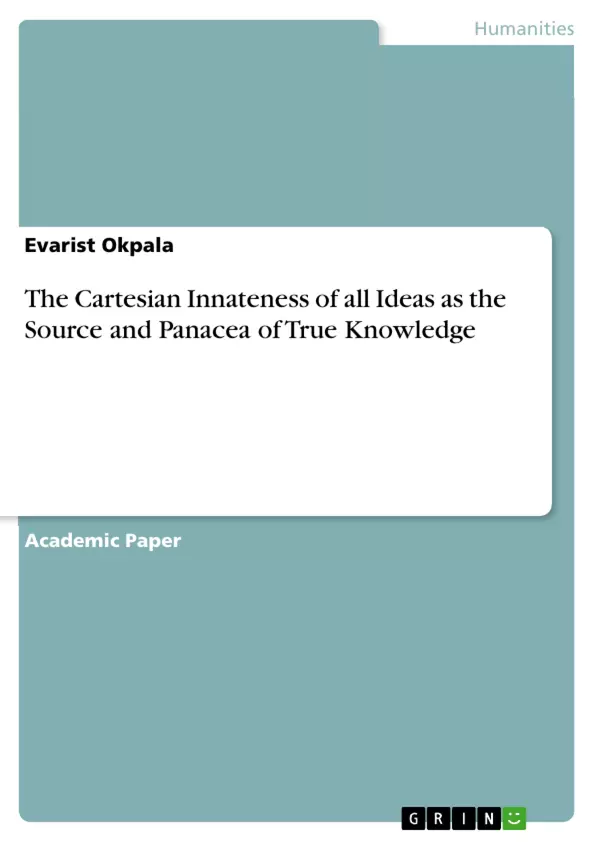The purpose of this work is to give credence to the admonition of St. Augustine, who admonished seekers of the truth to look inwards for that is where the truth lies. This admonition was adhered to by Descartes when he decided to reject all prior submissions of philosophy as well as the sciences in order to proceed methodically towards arriving at the truth which will not be further doubted. Thus, the work aims at exposing how the pure intellect and the ideas innate in it can give us certitude in knowledge in the light of Descartes’ philosophy.
Descartes’ intervention is quite significant in exposing that prior to his search for a strong foundation for the establishment of philosophy, all the claims that hitherto existed could not solve the problem of doubt. Such that none of the submissions could claim to have satisfied man’s natural craving for the truth, and the truth cannot be two.
Thus, this study is quite significant for it will try to assert once more that the truth is without doubt and it can be reached, irrespective of whether Descartes did a good job or not in his quest for the indubitable truth. And that, as Descartes believes, it can be arrived at more securely by looking inwards, in the man’s intellect which is the place not corrupted as the changing world of the senses. It will also mean that for the intellect to hold such truths which cannot change, it follows that there exists a source, which is greater than the human intellect from where comes the truths that exist in the human mind. Descartes’ thoughts around these will be properly highlighted to show how relevant they are in today’s world especially in the understanding of man as well as God, the source of everything that exists alongside man.
Inhaltsverzeichnis (Table of Contents)
- General Introduction
- Statement of the Problem
- Purpose of the Study
- Scope of the Study
- Significance of the Study
- Methodology of the Study
- Division of the Work
Zielsetzung und Themenschwerpunkte (Objectives and Key Themes)
The main objective of this work is to examine Descartes' conception of innate ideas as the foundation for certain knowledge, contrasting it with previous philosophical approaches. It aims to explore how innate ideas, understood as concepts present in the mind independent of sensory experience, provide a path to indubitable truth. The work investigates the implications of this view for understanding knowledge, reality, and the nature of the human intellect.
- Descartes' departure from earlier philosophical approaches to knowledge.
- The nature and characteristics of innate ideas.
- The role of innate ideas in achieving certain knowledge.
- The relationship between innate ideas and our knowledge of the external world.
- Critical evaluation of Descartes' theory of innate ideas.
Zusammenfassung der Kapitel (Chapter Summaries)
Chapter 1 will examine various philosophical contributions to the quest for certain knowledge, highlighting their shortcomings and Descartes' innovative approach. It will also explore Descartes' search for a foundational philosophical method.
Chapter 2 will delve into the concept of innate ideas, analyzing different interpretations and their impact on the pursuit of certain knowledge.
Chapter 3 will focus on the universality of innate ideas, particularly exploring how our understanding of the external world can be attributed to the intellect.
Schlüsselwörter (Keywords)
Innate ideas, Descartes, certain knowledge, philosophy, epistemology, rationalism, empiricism, methodological doubt, truth, intellect, senses.
- Quote paper
- Evarist Okpala (Author), 2024, The Cartesian Innateness of all Ideas as the Source and Panacea of True Knowledge, Munich, GRIN Verlag, https://www.grin.com/document/1516034



